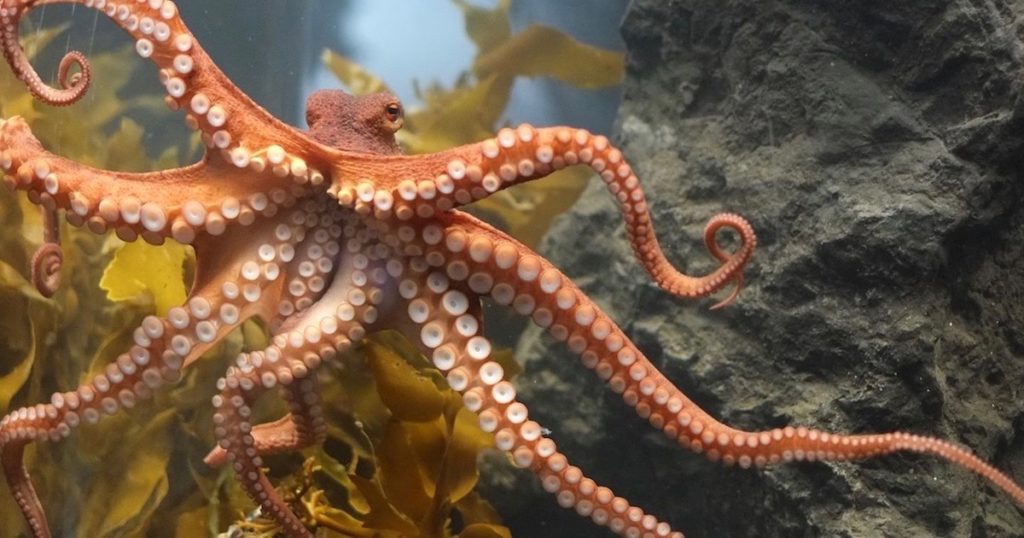 Intelligent Design
Intelligent Design
 Neuroscience & Mind
Neuroscience & Mind
If Octopuses Are So Smart, Should We Eat Them?

Extraordinary recent science discoveries regarding octopus intelligence have created an ethical dilemma: Octopus arms (tentacles) are gourmet delicacies in Korea, Japan, and the Mediterranean countries and many poor people make a living providing them. Factory farming of octopuses is slowly becoming practical.
But should we do to them what we wouldn’t do to dogs?
Octopuses present something of a puzzle. As Canadian investigative journalist Erin Anderssen pointed out earlier this month, “The octopus has already challenged our theories on evolution, intelligence and consciousness.”
Foiled Expectations
Evolution? We have tended to assume that intelligence rose with the development of a spinal cord and brain (vertebrates), and warm-bloodedness (mammals and birds). So invertebrates like octopuses were expected to be “naturally” less intelligent than, say, raccoons.
But they are not less intelligent. They have been called a “second genesis” of intelligence and the jury’s still out on how they came to be so. Some have made the argument — only partly in jest — that they might be alien life forms.
They defy stereotypes. Intelligence is believed by many researchers to have evolved naturally because of the need to get along in groups:
But the octopus is about as far from social as a smart animal can be. Confine two together, and one of them is likely getting eaten. The parents don’t hang around either: The male dies shortly after mating, and the female lays her eggs and dies around the time her babies hatch.
ERIN ANDERSSEN, “CONSIDER THE OCTOPUS, AND HOW IT COULD CHALLENGE OUR IDEAS ABOUT MEAT” AT THE GLOBE AND MAIL (JULY 3, 2022)
Octopuses have passed all sorts of maze tests. They have excellent long- and short-term memories. They can engage in (though this is disputed) observational learning, i.e. see a useful task performed and then imitate it. They can recognise individual humans. In an experiment, one person made much of the octopus while the other teased it with a wire brush: the octopus flaunted itself for the one and hid from the other.
Anecdotal evidence of intelligence is vivid and compelling: captive octopuses routinely leave their tanks to seek company, food and sex. They climb in and out of lobster-pots to take the trapped animals for themselves. People who work with them in aquaria say that octopuses have distinct personalities; this is not sentimentality but practical animal husbandry, as anyone who has worked in a stable knows.
SIMON BARNES, “THE ETHICS OF EATING OCTOPUS” AT SPECTATOR (JANUARY 16, 2021)
Roughly concurrent with the release of the film My Octopus Teacher (2020), a group of scientists led by Jennifer Jacquet published an influential essay against the commercial farming of octopuses for food: “We believe that octopuses are particularly ill-suited to a life in captivity and mass-production, for reasons both ethical and ecological.” (2019)
It’s an ethical and ecological issue but it’s also an economic and political one.
The Case for Octopus Farms
The decline in catches of wild octopuses worldwide is driving an interest in “octoculture” — which would employ people laid off from octopus fishing by new conservation regulations.
Some aspects of the octopus life cycle make them attractive aquaculture candidates. Like salmon, they’re short-lived and fast-growing; most common species live one to two years, a few jumbo varieties three to five. They can add 5 percent of body weight in a day.
ERIC SCIGLIANO, “THE WORLD WANTS TO EAT MORE OCTOPUS. IS FARMING THEM ETHICAL?” AT NATIONAL GEOGRAPHIC (FEBRUARY 21, 2020)
Not only that but octoculture can control cannibalism and possibly even save female octopuses from certain death after breeding (so that they can breed again):
In the wild, octopuses breed once, then cease hunting and waste away; the females spend their last weeks tending their eggs. (Nautiluses are the only members of the cephalopod family, which also includes squid and cuttlefish, known to breed repeatedly.) Now, with careful feeding and “ideal conditions,” Tur [Estrada] says, “we save the life of the female, which has never been documented before.” This summer they plan to try re-breeding one resuscitated female, herself captive-bred. She will then be two years old, about twice the average O. vulgaris lifespan.
ERIC SCIGLIANO, “THE WORLD WANTS TO EAT MORE OCTOPUS. IS FARMING THEM ETHICAL?” AT NATIONAL GEOGRAPHIC (FEBRUARY 21, 2020)
The chief practical obstacle to octoculture has been the tiny, delicate octopus hatchlings, which are difficult to raise. Thus, some fisheries resort to capturing wild, immature octopuses and growing them in tanks to market size. But those catches don’t live to breed in the wild. So, on the pro side, successful commercial octoculture would relieve the pressure on wild stocks. In any event the problem of raising hatchlings is likely to yield to further research.
However, as Erin Anderssen points out, “Farming an aquatic species doesn’t necessarily reduce pressure on wild stock — often, it just creates a larger market.” In any event, harvesting the huge amount of seafood required to feed captive octopuses would likely deplete the supply for wild ones.
Better Protected than Most Invertebrates
As cephalopods, they have been among the only invertebrates to gain some protection from cruelty in science research from the British government (Animal (Scientific Procedures) Act of 1986) and the European Union, as well as Canada, New Zealand, and Australia.
After a London School of Economics study, the British government extended the protection to commercial fisheries: “The review drew on over 300 existing scientific studies to evaluate evidence of sentience in cephalopods (including octopuses, squid and cuttlefish) and decapods (including crabs, lobsters and crayfish).” In the current social and legal environment, many will see a commercial proposal for farming octopuses as more like a proposal for farming dogs than, say, farming crickets.
Read the rest at Mind Matters News, published by Discovery Institute’s Bradley Center for Natural and Artificial Intelligence.
